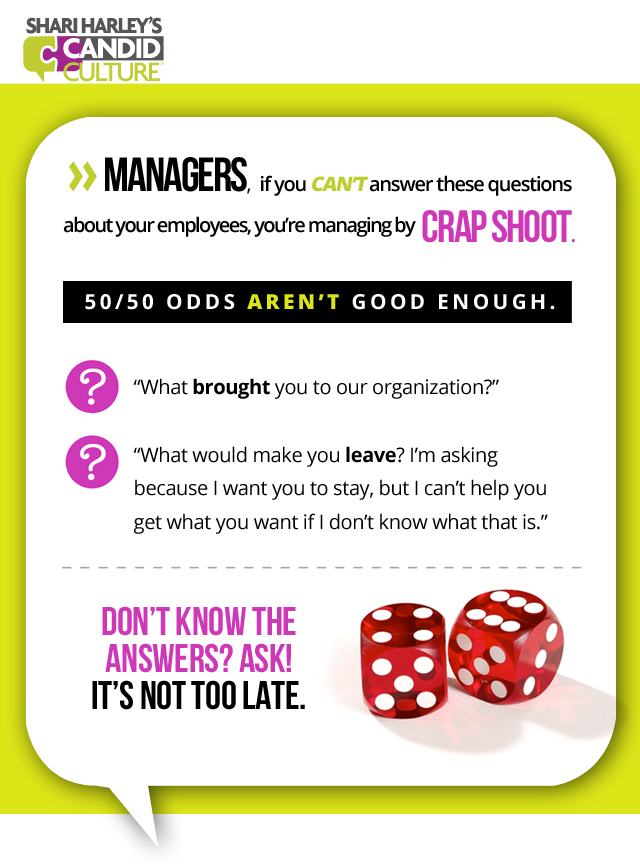Effective Management Requires Asking Questions
If an employee quits and the manager is surprised, shame on the manager. Employee turnover – literal turnover (he quits and leaves the building) or figurative turnover (he quits but continues to come in everyday and do his minimal best) – are extremely predictable.
Most employees need only a handful of things to be satisfied and productive at work. The key is getting employees to tell you what those things are. And they might just tell you, if you ask.
An employee’s first few weeks at a new job often involve a lot of training. Managers tell employees what they need to do and hopefully why they need to do those things. I recommend balancing telling with asking.
Effective management involves asking the seven questions below during the interview process, after an employee starts, and again 90-days to six months into the job.
Effective management question number one: “What brought you to this company? Why did you accept this job? What are you hoping the job will provide?” Ask one of these three questions. Pick the one you like best.
Effective management question number two: “What would make you leave this job? What are your career deal breakers, things you just can’t tolerate at work?” Ask either of these questions.
Effective management question number three: “What type of work, skills, and/or areas of our business do you want to learn more about?”
Effective management question number four: “Tell me about the best manager you ever had. What made him/her the best manager?” This will tell you what the employee needs from you as a manager and is a much better question than, “What do you need from me as your manager?” That is a hard question to answer. Telling you the best manager s/he ever had is easy.
Effective management question number five: “Tell me about the worst manager you ever had? What made him/her the worst manager?”
Effective management question number six: “What are your pet peeves at work? What will frustrate you?” Why find out the hard way what frustrates employees when it’s so easy to ask. This question demonstrates that you want your employees to be happy and that you will flex your own preferences, when possible, to meet employees’ needs.
Effective management question number seven: “How do you feel about being contacted via cell phone or text outside of business hours? How do you feel about receiving emails during the evenings and weekends?”
If you’ve participated in one of our effective management trainings and received a box of Candor Questions for Managers, you know I could go on. But these seven questions are a good start.
Regardless of age, gender, or work and educational background, all employees have a few things in common. Employees want to:
• Work for someone who takes an interest in and knows them
• Feel valued and appreciated for their contributions
• Be part of and contribute to something greater than themselves
• Feel respected as a person. Managers respect their time, expertise, and needs
Taking the time to get to know employees throughout your working relationship accomplishes many employee needs.
If you have long time employees, it’s never too late to ask these questions. Regardless of for how long employees have worked for you, they’ll appreciate you asking. There is no need to feel that employees will raise an eyebrow and wonder why you’re asking now. They’ll just be happy you’re asking. You can simply say, “I realized that I’ve never overtly asked these questions. I just assume I know. But I don’t want to do that. You’re too valuable to me and to the organization. During our next one-on-one meeting I’d like to ask you these questions and you can ask me anything you’d like.”
If you have a manager who will never ask you these questions, provide him/her the information. Don’t wait to be asked. You’re 100% accountable for your career. Tell your manager, “There are a few things about myself I want to share with you. I think this information will make me easier to manage and will help ensure I do great work for the organization for a long time.”
Managers, the better your relationship with your employees and the more you know about what your employees need from you, the organization, and the job, the easier employees are to engage, retain, and manage. Stop guessing and start asking.




